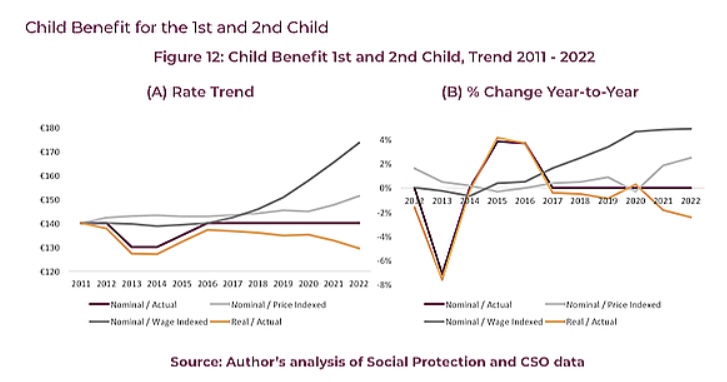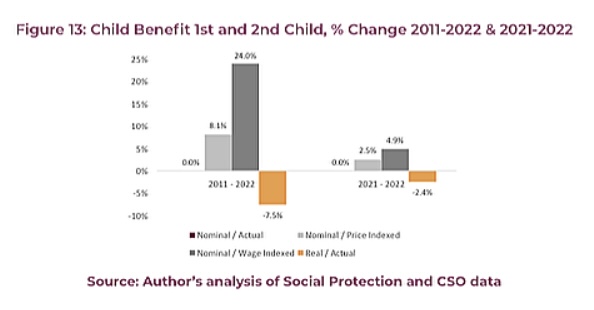Last week, to great fanfare, the government rolled out a minor improvement to the meagre supports it gives to families with children – that section of the population which provides society not just with stability, but with an actual future.
But it seems to have gone unnoticed in the media reporting around this payment – and in the coverage of Budget each year – that Child Benefit in Ireland hasn’t actually increased in a staggering 13 years.
Unlike the vague concepts of diversity and integration and progress, children are the most vital component to ensuring that Ireland, or any country, can continue to exist, rather than collapsing under the unsustainable burden of providing for an ageing and shrinking population when fertility rates are on the floor.
Yet for most of my adult life, the strong message coming from establishment Ireland was that having children was something only to be cautiously welcomed: and if you were a woman that was when, and only when, you had already shown your commitment to the sisterhood by seeking to smash glass ceilings and ensure equality was won for all.
This was key. Having children was begrudgingly afforded some importance, but only after you had achieved everything else.
So kids should only ever be considered after: success in your career; seeing the world (in a sustainable way); becoming a strong, independent woman (preferably in a STEM field); mastering yoga or spirituality (while avoiding organised religion); gaining a full appreciation of every other culture while sneering at your own as pale and stale; fulfilling all your dreams in every way possible while also attending pilates five times a week and having perfect teeth and hair and eyebrows and nails; and even then, only after due consideration was given to the impact your baby would have on the planet.
Children were absolutely not the priority, and anyone who suggested otherwise was confining women to the sink or making Gilead-like handmaids of us (though, strangely enough, the surrogacy industry was afforded no such criticism despite the glaringly obvious actual similarities there).
This cultural shift – where the importance of children to the country was diminished – was matched by government policy in areas like taxation. The policy of tax individualisation, prompted (of course) by the European Union’s desire to see increased numbers of mothers in the workforce, actually penalised families where mothers stayed at home to rear the children by forcing them to pay up to €6,240 every year in additional taxes.
(I put that figure in bold because it’s an enormous penalty, especially when looked at over the course of the 10 years a parent (usually a mother) might take out of the workforce to raise a family. The state has punished full-time mothers by perhaps €62,000 – and perhaps even more – for making a decision to rear their own children rather than using a créche. It remains a monstrously unfair proposal and completely upends the much-trumpeted claim that women are offered choices in this regard.)
But what most people may not realise is that long before the 1999 policy of tax individualisation, the government had made a radical change to how it recognised the cost of having and rearing children.
CHILD TAX ALLOWANCE ABOLISHED
Parents used to be able to avail of a child tax allowance, which meant that you could reduce the amount of tax you paid to Revenue according to how many children you had.
Given the fact that a) having and rearing children is an expense equal to no other, and b) parents who do so literally provide the country with future taxpayers, the allowance was rightly considered fair and equitable, and judged to be in support of a vital social objective. It wasn’t a gift from or of the State: it was a deduction from taxes precisely because of the importance of what was being provided in return.
Child tax allowances were then abolished and replaced with a child benefit payment. This was a more significant change that it might appear at first glance. It removed the recognition that a parent or parents were entitled to a tax credit for raising children because of the enormous contribution that made to society – and replaced it with a situation where families were seen to be getting a payment from the state.
Along with that change seemed to come a shift in attitudes: leading to the mind-boggling sort of nonsense dealt with in this blog from the ICTU which reveals that the amount spent by the government on child benefit “is open to regular criticism”.
“Some argue that the public purse should not be part-funding people’s choice to have a child. More often, others argue that, rather than scrapping it completely, Child Benefit should be taxed or only paid to low-income families.”
It’s important to be very clear here: one of the first obligations on a society is to support parents to have children. In my opinion, anyone who argues against that forgoes their claim to a state pension provided by the taxpayers who only exist because of ‘people’s choice to have a child’.
And, again, the public purse is not providing welfare to families – the child tax allowance was removed from parents, making child benefit necessary.
To be honest, this pernicious, ill-informed spite about families getting ‘handouts’ or ‘funding’ from the state makes me see red. Parents and families are indispensable. They are doing society an immeasurably important service, and while appreciation isn’t likely to be forthcoming, I’m long past tolerating unfounded criticism and snide remarks from the same people who’ll be lecturing you in the next breath about mindfulness and empathy.
But this mindset likely permeates the decision of policymakers at the highest level in Ireland – because how else can the almost unbelievable fact that, despite galloping inflation, Child Benefit hasn’t increased in thirteen years be explained?
This graph from the Parliamentary Budget Office (PBO) shows just how ludicrous the situation has been. This country increasingly feels anti-family and anti-child, a factor in the kickback


Child Benefit actually decreased from 2013-2015, and the state also undertook other equally stingy and anti-child measures such as abolishing a grant for multiple births, and also scrapping the small increase in payments for third and subsequent children.
The payments eventually returned to €140 per month in 2016, after three years of lower rates between 2013-2015 – but since then, as the PBO noted, Child Benefit “has not kept pace with either inflation or wage growth”.
The effect of that was made clear in their analysis: the payments for children needed to be increased to match inflation.
“In real terms, this means the 2022 rate of €140 will be €129.47 (2011 base). With 2011 as a base, the rate in 2022 would need to be €151.38 to stay in line with inflation over the period and would need to be €173.58 to stay in line with wage growth. This divergence from price and wage growth is most evident in 2021 and 2022, with the flat rate losing ground compared to the accelerating inflation and wage growth.
But that increase never happened – even though inflation, as everyone knows, has absolutely soared since the PBO analysis was issued. Amongst the hardest hit in a cost of living crisis are families with children because the bills are never-ending, and the demands of feeding and clothing and educating and raising the next generation are ever-escalating.
Yet, almost incredibly, no increase in payments was forthcoming for the people doing the most important work on earth. Let them eat cake, Irish-style. No increase in Child Benefit for 13 long years, and then we are meant to be grateful that the sop given has been extended to children who are over 18 and still in school. As if the same kids who we are told have to be given extra care during the Leaving Cert months can suddenly ditch all that and get a job and move out or something. It’s the usual contradictory mess from the inane governments we’ve had for the longest time, but the pattern is very clear: families with children are the lowest priority.
This contempt for child-raising is being shown at a time when all of Europe, and much of the rest of the world, is facing an unprecedented fertility crisis – with a demographic winter coming fast down the tracks that will make Covid look like a walk in the park. There will be insufficient taxpayers to pay pensions, to fund healthcare, or to drive growth, because a country that fails to have children faces a bleak future. Anyone having children in this climate should have praise and actual support heaped on them.
The rest of Europe woke up to this decades ago, offering generous “baby bonuses”, and travel and benefits to families, but successive Irish governments kept up idiotic policies like cutting Child Benefit, and then presided over a housing crisis that drove young people in despair at every being able to afford a home out of the country.
The same government is currently spending money like drunken sailors on shore leave – but on everything else except helping Irish parents raise the next generation. Billions are being splashed on a shambolic and grossly unfair immigration system; free medical cards are offered to everyone just in the door; millions thrown at diversity and inclusion; millions more wasted on RTÉ, etc etc etc.
But, inexplicably, there’s almost nothing for parents of children who maybe, just maybe, after 13 years of being told to get to the back of the queue, might feel they are long overdue an increased payment and some recognition of the importance of their role in society. It’s almost unbelievable. It shouldn’t be tolerated.
Part of the landslide NO NO vote in March was likely a growing pushback against a state and a government which increasingly feels anti-family and anti-child.
Part of the problem is that families are just too darn busy raising their children to kick up a fuss. But it time we stopped putting up with this open contempt towards the people actually providing the country with a future.